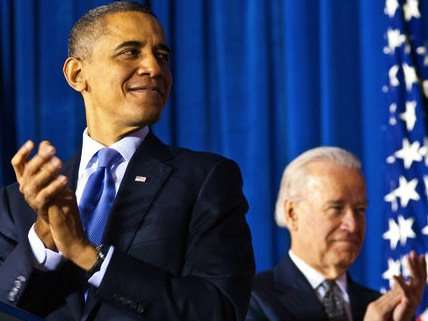Immigration and the Constitution: Does Obama Have the Law of the Land on His Side?

As Robby Soave previously noted, libertarian George Mason University law professor (and sometime Reason contributor) Ilya Somin has written a constitutional defense of President Barack Obama's unilateral immigration action. I wanted to highlight one particular prong of Somin's argument. He writes:
the immigration laws covered by the president's executive order may go against the original meaning of the Constitution. Under the original understanding, Congress did not have a general power to restrict immigration (though it did have power over naturalization). That may not matter to adherents of "living constitution" theories of legal interpretation. It also should not matter to those who believe that the Constitution generally means whatever Supreme Court precedent says it means. Immigration restrictions have been deemed permissible under longstanding precedent dating back to 1889.
But it should matter to those who consider themselves constitutional originalists, which includes many of the conservatives who have been most vehement in opposing Obama's actions today. If you believe that the Constitution should be interpreted in accordance with its original meaning, and that nonoriginalist Supreme Court decisions should be overruled or at least viewed with suspicion, then you should welcome the use of presidential discretion to cut back on enforcement of laws that themselves go against the original meaning.
I am no fan of the Obama administration's approach to constitutional interpretation. In too many instances, the president really has acted illegally and undermined the rule of law—most notably by starting wars without congressional authorization. But today's decision isn't one of them.
This is a compelling argument. America's current immigration regime does raise significant constitutional questions and should therefore be viewed with suspicion by constitutional originalists. Unfortunately, the Obama administration is not making that argument. In fact, the White House has done its best to undermine Somin's position and hinder its future success.
How? By repeatedly embracing a sweeping theory of congressional power that would certainly cover the federal immigration policies at issue here. For example, in the 2012 litigation over the Patient Protection and Affordable Care Act, the Obama administration fully embraced the Supreme Court's notorious 2005 decision in Gonzales v. Raich, which said that California residents using medical marijuana legally under state law are nonetheless still subject to criminal sanction under the federal Controlled Substances Act. Why? Because the Commerce Clause allows Congress to "regulate activities that substantially affect" the nation's commerce. And according to Raich, such activities include the purely local act of cultivating and consuming a plant entirely within the confines of a single state.
Well, if that sort of activity now falls within the reach of Congress via the Commerce Clause—which covers both interstate commerce and "Commerce with foreign Nations"—it's hard to see how today's immigration controls would not also fall within the White House's broad conception of congressional power. Foreign migrants arriving in the United States have at least as much of a substantial commercial impact as do medical marijuana patients whose local treatment is sanctioned by state law. The original Constitution may not have granted Congress the authority to impede immigration as it does today, but that document also did not grant Congress the power to regulate purely local economic activity as it does today. The modern Commerce Clause interpretation endorsed by the White House, however, would seem to cover both.
To be sure, Professor Somin has identified a strong originalist argument for use against today's federal immigration system. Too bad the Obama administration lacks the constitutional understanding to make that argument stick.


Show Comments (48)